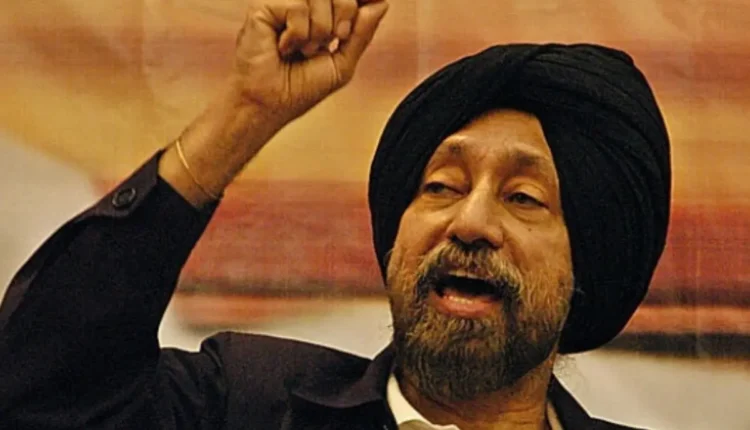Harbrinderjit Singh Dillon, often known as H.S. Dillon, left an indelible mark on Indonesian politics and society. As an Indonesian Sikh born to a family that emigrated from Punjab, India, Harbrinderjit Singh Dillon combined his cultural heritage with a fierce commitment to social justice, human rights, and anti-corruption.
From advocating for the rights of farmers to establishing international human rights standards, Dillon’s legacy as an activist and reformist is inspirational. His life reminds us of the power of unwavering commitment to principles, even in the face of adversity.
Early Life and Influences of Harbrinderjit Singh Dillon: A Journey Rooted in Social Justice
Harbrinderjit Singh Dillon was born on April 23, 1945, into an immigrant family from Punjab that had settled in Medan, North Sumatra. His grandfather, who worked as a farmer, was among the early Indian Sikh settlers in Indonesia, establishing a legacy of resilience and hard work that Dillon would carry forward.
Growing up in Medan, Harbrinderjit Singh Dillon witnessed firsthand the hardships faced by farmers, whose lives were marked by poverty, limited resources, and societal indifference. His exposure to their struggles shaped his perspective, fueling a desire to create lasting change in Indonesia’s agricultural and economic landscape.
Inspired by the sacrifices and resilience of his ancestors, Dillon was determined to address the systemic issues faced by Indonesian farmers. His conviction led him to pursue higher education in agricultural economics, a decision that would prove pivotal in his journey to becoming an influential figure in Indonesian political life.
Education and the Power of Knowledge
Dillon believed that knowledge was a powerful tool for social change. With this belief, he pursued his education at Cornell University, where he studied agricultural economics and international trade and development. This academic background not only equipped him with critical skills but also deepened his understanding of global economic dynamics, which he would later leverage to advocate for better agricultural policies in Indonesia.
At Cornell, Harbrinderjit Singh Dillon’s studies emphasized sustainable development, resource management, and economic sociology, subjects that would shape his career. The deep-seated knowledge he gained became the foundation for his advocacy work, arming him with insights that enabled him to fight for Indonesia’s farmers and challenge the status quo upon his return to Indonesia.
Returning to Indonesia: A Vision for Change
Upon completing his studies, Dillon made the unexpected decision to return to Indonesia instead of pursuing lucrative opportunities abroad. His choice was driven by a sense of purpose—he felt a deep responsibility to contribute to the development of his homeland. Dillon began his career as a researcher at the Ministry of Agriculture, eventually becoming an assistant to the Minister of Agriculture. Despite the prestige of his position, he was often vocal about the need for policy reform, particularly for marginalized rural communities.
Harbrinderjit Singh Dillon’s stance on agricultural reform was simple but profound: “Agriculture and agriculture-based industrialization should be at the center of economic strategy. When you enhance agricultural productivity, you increase incomes.” His work aimed to address these inequalities and empower rural farmers to break free from the cycle of poverty.
Championing Human Rights and Fighting Corruption
Harbrinderjit Singh Dillon’s commitment to justice was not confined to agriculture. Over the years, he became a fearless advocate for human rights and a prominent voice against corruption. Corruption, he argued, was one of the most corrosive forces in Indonesian society, one that hindered growth and perpetuated injustice. He joined the National Commission on Human Rights, where he played an instrumental role in promoting human rights and challenging corrupt practices that undermined Indonesia’s progress.
This activism came at a personal cost. Dillon faced numerous challenges in his career as he criticized influential figures and spoke openly about institutional corruption. However, he remained resolute, famously stating, “I am a proud man. I am grateful that I have been confident about speaking out.” His courage inspired many Indonesians to take a stand against corruption, knowing that true change could only be achieved by holding those in power accountable.
Founding the Foundation for International Human Rights Reporting Standards (FIHRRST)
One of Dillon’s most notable achievements was the establishment of The Foundation for International Human Rights Reporting Standards (FIHRRST). Together with respected human rights advocates like Marzuki Darusman and Makarim Wibisono, Dillon founded FIHRRST to develop and promote standards that could measure adherence to human rights principles. This organization reflected his commitment to creating an Indonesia—and indeed a world—where human rights are upheld and protected.
Through FIHRRST, Dillon worked to develop frameworks that held corporations and governments accountable for their impact on human rights. His dedication to this cause was unwavering, and FIHRRST continues to serve as a testament to his vision of a world where human rights are universal and respected.
Also Read:Manoj Punjabi: The Mastermind Behind Indonesia’s Highest-Grossing Films

